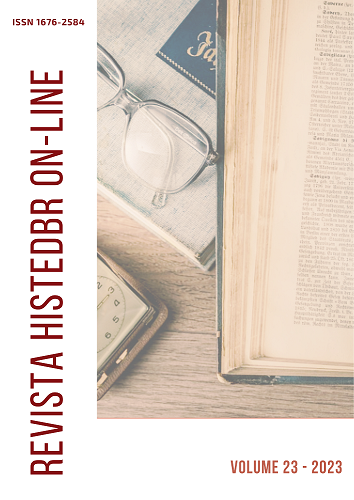Abstract
This article aims at analyzing the role of the public school in the fight against fake news. The theoretical-methodological referential used is based on historical materialism and historical-critical pedagogy. The term fake news is understood as false news, intentionally manipulated in order to deceive the receiver of disinformation. The public school must allow the student to appropriate the technology that enabled the creation and dissemination of fake news, learn to navigate the virtual environment in an ethical way and in opposition to fake news that stimulate hate speech, prejudice and that are contrary to the interests of the working class. In addition, understand that a significant part of fake news is created by powerful corporations, with abundant financial resources and by specialized people, who participate in the dispute for economic and political power as organic intellectuals of the ruling classes. Finally, the public school must fulfill the function of equipping students/social agents with the necessary tools for the class struggle in today's society.
References
ALTHUSSER, L. Ideologia e aparelhos ideológicos do Estado. Lisboa: Presença, 1974.
BERGER, G. Prefácio. In: IRETON, C.; POSETTI, J. (org.). Jornalismo, fake news e desinformação: manual para educação e treinamento em jornalismo. UNESCO, 2019. Disponível em: https://unesdoc.unesco.org/ark:/48223/pf0000368647?posInSet=2&queryId=a8050576-9941-4456-ae89-db14a68715c2. Acesso em: 05 abr. 2021.
BRASIL. Ministério da Educação. Base Nacional Comum Curricular. Brasília, 2018. Disponível em: http://basenacionalcomum.mec.gov.br/images/BNCC_20dez_site.pdf . Acesso em: 05 abr. 2021.
BUCCI, E. Pós-política e corrosão da verdade. Revista USP, n. 116, p. 19-30, 2018. Disponível em: https://www.revistas.usp.br/revusp/issue/view/10663. Acesso em: 05 abr. 2021.
CHAUI, M. Convite à Filosofia. São Paulo: Ática, 1994.
COSTA, F. Editorial. Revista USP, n. 116, p. 01, 2018. Disponível em: https://www.revistas.usp.br/revusp/issue/view/10663. Acesso em: 05 abr. 2021.
FRIAS FILHO, O. O que é falso sobre fake news. Revista USP, n. 116, p. 39-44, 2018. Disponível em: https://www.revistas.usp.br/revusp/issue/view/10663. Acesso em: 05 abr. 2021.
GENESINI, S. A pós-verdade é uma notícia falsa. Revista USP, n. 116, p. 45-58, 2018. Disponível em: https://www.revistas.usp.br/revusp/issue/view/10663. Acesso em: 05 abr. 2021.
GRAMSCI, A. Os intelectuais e a organização da cultura. Rio de Janeiro: Civilização Brasileira, 1993.
MARX, K. Contribuição à crítica da economia política. São Paulo: Martins Fontes, 1983.
MARX, K.; ENGELS, F. A ideologia alemã. São Paulo: HUCITEC, 1986.
NASCIMENTO. C. E. G. Fake news, mentira organizada e educação: uma reflexão a partir do pensamento de Hannah Arendt. Revista docência e cibercultura, v. 4, n. 1, p. 243-263, 2020. DOI: https://doi.org/10.12957/redoc.2020.47553. Disponível em: https://www.e-publicacoes.uerj.br/index.php/re-doc/article/view/47553. Acesso em: 05 abr. 2021.
PINSKY, J.; PINSKY, C. B. A história contra-ataca. In: PINSKY, J.; PINSKY, C. B. (org.). Novos combates pela história: desafios – ensino. São Paulo: Contexto, 2021. p. 9-21.
RECUERO, R.; GRUZD, A. cascatas de Fake News políticas: um estudo de caso no Twitter. Galáxia, n. 41, p. 31-47, 2019. DOI: http://dx.doi.org/10.1590/1982-25542019239035. Disponível em: https://www.scielo.br/j/gal/a/Kvxg4btPzLYdxXk77rGrmJS/?format=pdf&lang=pt. Acesso em: 05 abr. 2021.
REVISTA USP. São Paulo: Revista USP, 1989-. 2018. Dossiê pós-verdade e jornalismo. Disponível em: https://www.revistas.usp.br/revusp/issue/view/10663. Acesso em: 05 abr. 2021.
RODRIGUES, I. Usos pedagógicos para YouTube e podcasts. In: PINSKY, J.; PINSKY, C. B. (org.). Novos combates pela história: desafios – ensino. São Paulo: Contexto, 2021. p. 175-197.
SANTAELLA, L. A pós-verdade é verdadeira ou falsa? São Paulo: Estação das letras e cores, 2019.
SAVIANI, D. Educação: do senso comum à consciência filosófica. 19. ed. Campinas: Autores Associados, 2013.
SAVIANI, D. Escola e democracia. 42. ed. Campinas: Autores Associados, 2012.
SAVIANI, D. Pedagogia histórico-crítica, quadragésimo ano: novas aproximações. Campinas: Autores Associados, 2019.
SAVIANI, D. Pedagogia histórico-crítica: primeiras aproximações. 11. ed. Campinas: Autores Associados, 2011.
TAMBARA, E.; OLIVEIRA, A. R. Fontes e métodos na história da educação. In: XAVIER, L.; TAMBARA, E.; PINHEIRO, A. C. F. (org.). História da Educação no Brasil: matrizes interpretativas, abordagens e fontes predominantes na primeira década do século XXI. Vitória: EDUFES, 2011. p. 143-162.

This work is licensed under a Creative Commons Attribution-NonCommercial 4.0 International License.
Copyright (c) 2023 Itamaragiba Xavier


